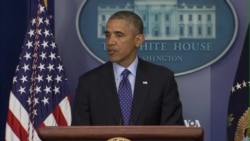WASHINGTON —
President Barack Obama continues to rule out sending U.S. combat forces to Iraq, while voicing concern about Sunni militants who have seized large swaths of territory north of Baghdad. Meanwhile, the Iraqi crisis has emboldened critics of Obama’s foreign policy, including an architect of the Iraq War launched in 2003: former Vice President Dick Cheney.
Thousands of Iraqi Shi'ites race to Baghdad to defend it against militants of the Islamic State of Iraq and the Levant (ISIL) who continue to capture towns and threaten the country's oil infrastructure.
A potential refugee crisis is brewing amid shortages of fuel and medicine elsewhere in the country.
President Obama says the situation could spread more broadly in the Middle East, but continues to limit the scope of potential U.S. involvement.
“American forces will not be returning to combat in Iraq, but we will help Iraqis as they take the fight to terrorists who threaten the Iraqi people, the region and American interests as well," says Obama.
But America is shrinking from the world stage with disastrous results, according to former Vice President Dick Cheney.
“We have left a big vacuum in the Middle East by our withdrawal from Iraq with no stay-behind agreement, by the commitment he (Obama) made a couple weeks ago that we are going to completely withdraw from Afghanistan with no stay-behind agreement. They (the Obama administration) are still living back in the day when they claimed, ‘We got [Osama] bin Laden, the terrorism problem is solved.' That was not true then; it is even less true today,” said Cheney, speaking on ABC’s This Week program.
The Iraq War remains one of America’s least popular military engagements, and polls show little support for another armed U.S. intervention in Iraq. Democratic Senator Harry Reid heaped scorn on Cheney.
“If there is one thing this country does not need, it is that we should be taking advice from Dick Cheney on wars,” said Reid.
But many Republican lawmakers, and some Democrats, say the United States must consider a more muscular response to terrorist-fueled militancy engulfing the Middle East. Among them is Senator John McCain.
“They will pose a direct threat to the security of the United States. I say to the critics who say do nothing and let them (Iraqis) fight it out, you cannot confine this conflict to Iraq and Syria,” said McCain.
Iraq’s government has requested U.S. air strikes targeting Sunni militants, an option President Obama has neither ruled in or out.
U.N. Secretary General Ban Ki-moon has said air strikes will be of little use without what he termed a more “inclusive government in Iraq.”
Thousands of Iraqi Shi'ites race to Baghdad to defend it against militants of the Islamic State of Iraq and the Levant (ISIL) who continue to capture towns and threaten the country's oil infrastructure.
A potential refugee crisis is brewing amid shortages of fuel and medicine elsewhere in the country.
President Obama says the situation could spread more broadly in the Middle East, but continues to limit the scope of potential U.S. involvement.
“American forces will not be returning to combat in Iraq, but we will help Iraqis as they take the fight to terrorists who threaten the Iraqi people, the region and American interests as well," says Obama.
But America is shrinking from the world stage with disastrous results, according to former Vice President Dick Cheney.
“We have left a big vacuum in the Middle East by our withdrawal from Iraq with no stay-behind agreement, by the commitment he (Obama) made a couple weeks ago that we are going to completely withdraw from Afghanistan with no stay-behind agreement. They (the Obama administration) are still living back in the day when they claimed, ‘We got [Osama] bin Laden, the terrorism problem is solved.' That was not true then; it is even less true today,” said Cheney, speaking on ABC’s This Week program.
The Iraq War remains one of America’s least popular military engagements, and polls show little support for another armed U.S. intervention in Iraq. Democratic Senator Harry Reid heaped scorn on Cheney.
“If there is one thing this country does not need, it is that we should be taking advice from Dick Cheney on wars,” said Reid.
But many Republican lawmakers, and some Democrats, say the United States must consider a more muscular response to terrorist-fueled militancy engulfing the Middle East. Among them is Senator John McCain.
“They will pose a direct threat to the security of the United States. I say to the critics who say do nothing and let them (Iraqis) fight it out, you cannot confine this conflict to Iraq and Syria,” said McCain.
Iraq’s government has requested U.S. air strikes targeting Sunni militants, an option President Obama has neither ruled in or out.
U.N. Secretary General Ban Ki-moon has said air strikes will be of little use without what he termed a more “inclusive government in Iraq.”





